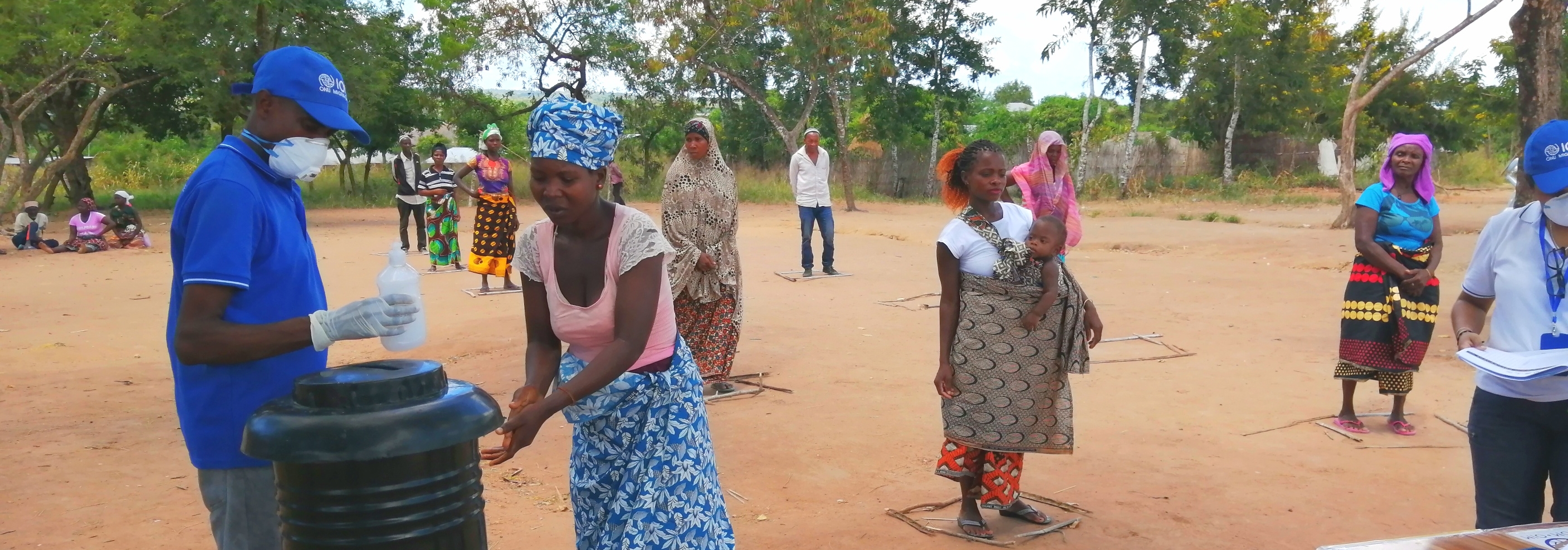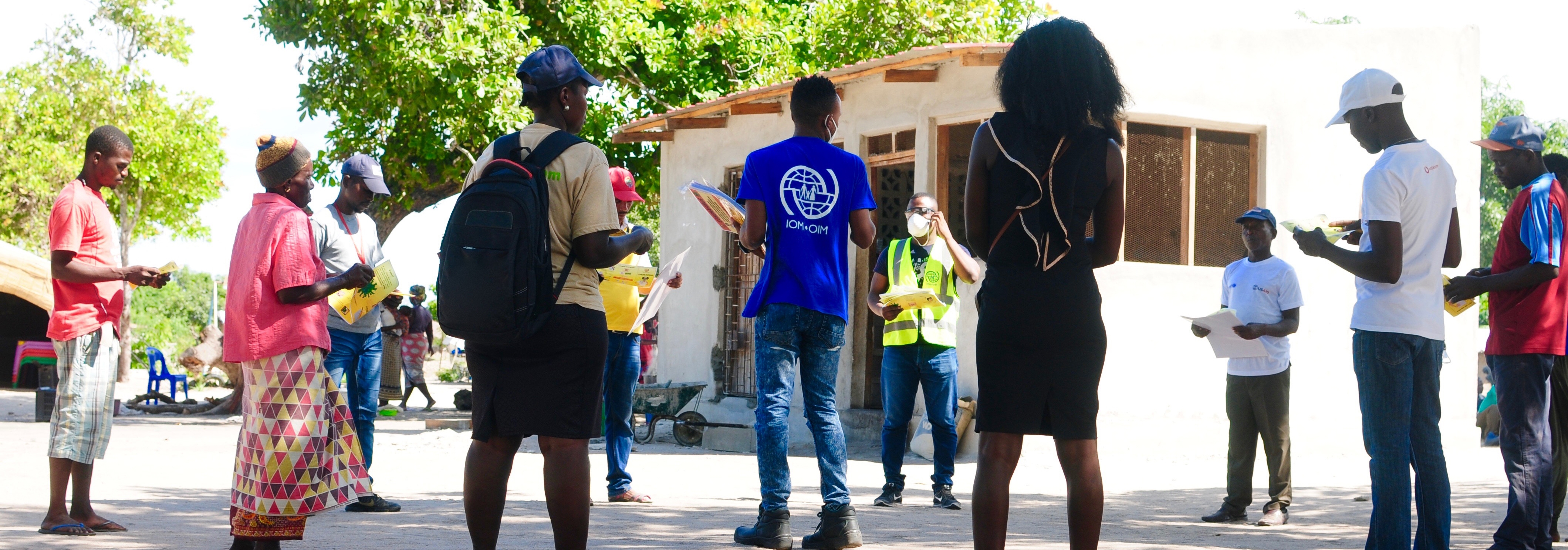IOM Vision
IOM aims to continue to be a key partner of the Government of Mozambique in supporting displaced persons and other affected populations in building resilience and progress towards sustainable solutions to displacement while ensuring a continuous response to critical humanitarian needs and rapid response capacities in case of a new disaster and crisis. IOM also strives to facilitate recovery and resilience in Mozambique through an effective and locally owned framework that addresses the lifesaving and longer-term needs of affected populations with the goal of establishing the basis for recovery and crisis prevention in communities.
Objective
Saving lives and protecting people on the move
Internally displaced populations in host communities, temporary and relocation sites, host communities themselves affected by insecurity, as well as migrants and people at risk of displacement dueto conflict and natural hazards.
|
|
Health facilities in crises affected areas in Northern and Central Mozambique are under pressure due to increased demand for services and lack of resources and capacity to cope with the increased catchment population due to displacement. Especially in the areas receiving people displaced due to insecurity in Cabo Delgado, districts’ health services have limited capacity and logistical resources to fully integrate newly displaced and resettled communities into their regular outreach services schedule. In addition, the COVID19 pandemic has put additional risks to public health, especially for migrants and internally displaced people as they are on the move and sometimes face additional issues to access services.Key programmatic interventions include:
|
|
IOM will continue assisting people living in insecurity-affected communities with the provision of MHPSS, particularly in communities affected by stressful events and multiple displacements. Key programmatic interventions include:
All MHPSS activities will be in line with the IOM Manual on Community-Based Mental Health and Psychosocial Support in Emergencies and Displacement and coordinated with partners. |
|
IOM will continue working to promote access to protection services for IDPs and host communities, including in relocation sites. Through its integrated approach targeting priority displacement sites and areas receiving new arrivals, the multi-sector approach will include protection, medical and MHPSS support to respond to the needs of affected households and the most vulnerable individuals. Key programmatic interventions include:
|
|
IOM’s WASH interventions aim at improving access to sufficient and safe WASH services for insecurity-affected populations, as well as improving hygiene practices in displacement sites and host communities in northern Mozambique. All distribution and hygiene promotion activities will be implemented following national guidelines on COVID-19 preventive measures, such as physical distancing. Key interventions include:
|
|
Displaced populations and their host communities are in urgent need of emergency shelter support, including essential household items to secure safe, dignified, and healthy living conditions that provide at least basic protection from further adversities. Key interventions for this sector include:
|

Objective
Driving solutions to displacement
Internally displaced persons and affected communities, as well as communities at risk of displacement due to natural hazards and/or insecurity. This pillar of intervention includes durable solutions, shelter and housing recovery as well as peacebuilding. It aims to build on the coping capacities of beneficiaries to strengthen the resilience of IDPs and other affected populations and at-risk communities.
|
Although the need for essential life-saving assistance remains widespread, IOM recognizes the urgent need for recovery and stabilization interventions. Community stabilization seeks to support governments, states and communities undergoing significant socioeconomic and political changes during and following a crisis, in order to (re)establish stability and security, prevent further forced migration, restore trust among community members, vulnerable populations and local authorities and lay the foundations for durable solutions, lasting peace and sustainable development. Key interventions in this area include:
|
|
The process of finding durable solutions to displacement is critical beyond the initial emergency response, spanning through mitigation of displacement risks and addressing the root cause of displacement, in alignment with the IASC durable solutions principles. In 2016, IOM adopted the Progressive Resolution of Displacement Situations (PRDS) Framework which aims to guide IOM and inform its partners to frame and navigate the complexity of forced migration dynamics and support efforts to progressively resolve displacement situations. In line with the PRDS Framework, IOM will continue to promote an inclusive, resilience-based approach in Mozambique and embrace mobility strategies that support progression towards resolving displacement, while ensuring safety nets are in place to avoid potentially harmful mobility strategies. Under this objective, IOM will support IDPs living in resettlement sites in the central area and northern Mozambique and affected communities through preventive and recovery measures using a holistic approach. Key programmatic interventions include:
|
|
The current health and social system capacities remain overstretched. IOM’s intervention will aim to strengthen the capacity of the public health authorities to deliver services in areas affected by insecurity and with a high concentration of IDPs. IOM will continue supporting provincial and district health services to implement mobile outreach services to highly affected and hard-to-reach communities, with logistics support and technical assistance. Key programmatic activities include:
|
|
Insecurity, displacement and natural disasters cause significant psychological and social suffering to affected populations, particularly in the medium to long-term. As aligned with the multisector integrated approach towards more durable solutions, IOM will continue assisting people living in displacement sites and affected communities through individual and community-based support based on IOM's global expertise and local capacities. This will be done through an integrated MHPSS approach, and include protective and preventive measures that seek to encourage social cohesion and conflict resolution within affected communities.Key programmatic interventions will be tailored depending on the context and include:
|
|
IOM Mozambique’s Peacebuilding and Disarmament, Demobilization and Reintegration programme aims both to prevent and resolve tension and insecurity. It does so by addressing these as drivers of displacement and by supporting sustainable peace and reintegration. These programmatic responses focus on understanding the root causes and addressing the social, economic, resource or political dynamics that drive insecurity and tension. Key interventions include:
|
Objective
Strengthen preparedness and reduce disaster risk
Target beneficiaries are internally displaced populations in resettlement and relocation sites, areas at risks and host communities affected by crisis. The interventions strongly focus on communities at risk of displacement due to natural disasters or insecurity and will strongly involve community engagement to ensure people that may face particular risks of experiencing harm following a disaster, such as persons with disabilities, elderly, and women and girls are reached and included in the response.
|
IOM Mozambique’s work on DRR will contribute to the government’s efforts to implement the Sendai Framework for Disaster Risk Reduction 2015-2030. IOM’s DRR programmes will integrate mobility-based strategies in efforts to reduce disaster risk and strengthen resilience. Paying particular attention to at-risk communities, migrants, including displaced populations, and other vulnerable mobile groups, this programming aims to prevent or reduce displacement through support for prevention and mitigation, risk governance and information, as well as strengthen resilience through “build back better” measures in recovery and reconstruction. It will further include further key interventions:
|
|
IOM aims to support the government and humanitarian partners to provide an effective operational response to ongoing and sudden-onset emergencies in Mozambique. Through the Inter-Agency Standing Committee (IASC), IOM supports collaborative responses conducted in close cooperation with the UN system and other organizations and with due respect for individual mandates and expertise. Its participation in the United Nations Consolidated Appeals Process, its lead role under the cluster approach in camp coordination and camp management in natural hazards, and the fact that it is a key partner in emergency shelter, logistics, health, protection and early recovery ensure that its activities are well coordinated. IOM ensures a strong preparedness element through its intervention, ensuring systems, capacities - including rapid response capacities - are in place to respond to disasters and new crises as well as to mitigate their inputs. This is done in coordination with partners thorough the clusters led by IOM as well through its operational capacities for its programmes. Key interventions include:
|
|
IOM works in close collaboration with the National Migration Service (SENAMI) on interventions at the points of entry (PoEs), with SENAMI being the coordinating entity of relevant government actors at the borders. Key interventions will include:
|
Objective
Contribute to an evidence-based and efficient crisis response system
Institutions, particularly INGC, as well as crisis response partners, who will benefit from displacement data and other information management products to support evidence-based planning.
|
The Displacement Tracking Matrix (DTM) remains the main provider of data to support humanitarian response planning as well as data on preparedness, resilience and recovery needs. Information on the conditions and needs of affected communities, displacement sites (resettlement, reception and displacement hotspots and/or relocation sites) and host communities remains of key-importance to identify priorities for the different sectoral responses. IOM Mozambique will continue to implement the DTM countrywide, targeting different types of displacement. Products will be adapted to provide relevant and up-to-date information for different scenarios and geographic coverage. DTM information packages will include Monthly Baseline reports, Flash reports (Emergency Tracking Tool - ETT) in case of sudden and significant displacement, as well as thematic reports and analysis (including sex- and age-disaggregated data) on specific topics of interest to IOM and its partners to inform evidence-based planning and programming. Key programmatic interventions include:
|
Mozambique
The map used here is for illustration purposes only. Names and boundaries do not imply official endorsement or acceptance by IOM.
Figures are as of 31 December 2023. For more details of IOM's operational capacity in country, please see the IOM Capacity section.

















